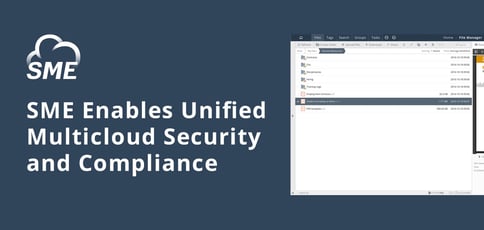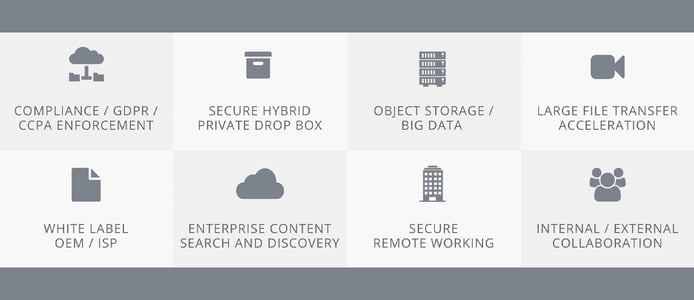
TL; DR: Storage Made Easy (SME) is a cloud service broker platform that unifies in-cloud and on-premises infrastructure to make data management and compliance a breeze. The company’s Enterprise File Fabric keeps businesses secure through a single, easily manageable converged storage system with customizable security, governance, and audit controls. Between an agile and talented remote workforce, and plans to expand via partnerships, SME is working diligently to become the number one cloud storage broker and provider of cross-platform services.
Building a stable, strong IT infrastructure is a bit similar to designing buildings that will withstand the seismic waves of an earthquake.
Reinforcing these structures requires expert knowledge, better technology, and adherence to building and planning codes. It’s not easy, but in the face of a high-magnitude earthquake, no one will regret thinking ahead.
With the arrival of COVID-19, “The Big One” has arguably hit the network infrastructure world. Those with legacy infrastructure have struggled to keep on-premises data sets accessible to remote workers, while those who prepared are emerging from the pandemic’s initial shocks far less shaken.
Jim Liddle, CEO of Storage Made Easy (SME), told us that his company’s Enterprise File Fabric allowed customers to securely access existing on-premises and in-cloud resources when working remotely in lockdown.

Storage Made Easy (SME) lives up to its name via unified data security and compliance on-premises and across clouds.
“For companies using our file fabric, nothing changed,” Jim said. “They continue to be able to access on-premises data at web-scale through smart integrated desktop drives. All interactions are monitored and audited, and employees maintain productivity despite their remote locations.”
SME can help businesses that were not prepared ease COVID-19 aftershocks while building a storage infrastructure that’s fit for the future. To that end, the company provides applications, training, support, training, and other professional services that empower customers and partners to build robust proprietary and open-source storage solutions.
Ultimately, SME aims to leverage both its agile workforce and plans for expansion via partnerships and integrations to become the number one cloud storage broker and provider of cross-platform services.
Providing a Central Location for Company Data Since 2009
When Jim founded the UK-based company in 2009, he initially named it SMEStorage.
“I had a vision of creating a unification hub for company data — a single place where companies were able to manage content and set common policies across datasets — because nothing like that existed,” he said. “Today, it has become more important to get a handle on data because of the increasingly stringent compliance regimes, such as the General Data Protection Regulation (GDPR) and the California Consumer Privacy Act (CCPA).”
Jim told us that SME was an early player in multicloud management — defined as the ability to manage multiple public clouds, private clouds, and datacenters as if they existed within a single environment. Fittingly, the company’s original tagline was SMEStorage: The Multicloud Company.

The company’s Enterprise File Fabric provides a single control point for all data.
“The very first storage connect we added was Amazon S3, prior to Amazon Web Services (AWS) being recognized as the big gorilla in the cloud space that it is today,” he said. “We ended up re-branding to Storage Made Easy because our product made it easier to manage multiple disparate storage endpoints.”
Today, prospects and customers refer to the company simply as SME and call its flagship product the Enterprise File Fabric. From the beginning, the file fabric’s secret sauce has been its ability to mine content metadata from file and object-based storage solutions.
“Over time, the metadata collected evolved from simple information, such as name, date, size, location, to also incorporate content metadata,” Jim said. “The product now includes integrations with AI-based content metadata enhancement services, including Google Vision.”
This metadata provides the basis for many data services, enterprise content searches across all mapped storage endpoints, real-time content detection, data classifications, and data catalogs.
Keeping Businesses Secure Amid Quickly Changing Infrastructure
Jim told us that many companies leverage multicloud storage at what he calls the bits and bytes level, but few are using it for application solutions, where a considerable amount of data productivity and ROI resides.
As digital data continues to grow exponentially and is stored across siloed services far from the corporate perimeter, companies are beginning to adopt a hybrid approach to data storage.
“This presents challenges for companies particularly in regard to how they deal with this rapidly growing distributed data set,” Jim said. “How do they secure the data, make sure it is compliant, and ensure it can be found when needed and presented in the ways they need it to be?”

The platform is suitable for a wide range of use cases within the enterprise.
SME’s file fabric serves as a way to answer these questions. Rather than forcing companies to abruptly switch systems, the technology works within the framework that already exists, ensuring data agility and seamless productivity.
The infrastructure-agnostic platform, which works in the cloud, on-prem, and in hybrid environments, also has a good list of use cases — from data protection and compliance solutions to file sharing, remote working, and managed services, among others.
“Customers often appreciate the simplest of things, such as the FileBox feature that allows them to email the content and attachments directly to a folder of mapped storage endpoints,” Jim said. “Another example is built-in DLP support for watermarking documents and adding trackable codes.”
Jim told us that features such as these are typically only available under some type of vendor lock-in. But SME’s file fabric includes these perks for all storage under management — which makes it easier for consumers to be productive while working with data.
An Agile, Remote Workforce Made Up of Diverse Talent
The SME team strives to remain flexible in the face of an ever-changing storage and IT infrastructure space, adapting to shifts and challenges to stay competitive.
“For example, VMware and virtualization significantly changed the IT infrastructure space, and Docker was able to grow so quickly because it connected containers to the developer,” Jim said. “Kubernetes then automates the scaling, managing, updating, and removing containers.”
Jim told us that containerization makes a lot of sense for the file fabric stack; thus, the company has put in a lot of work to take advantage of the technology in its forthcoming release. In terms of internal development, the company’s road map is a reflection of approximately 70% customer requests and 30% innovation.
“While this may seem to indicate that the product cycle has become less innovative actually what we find is that, of the 70% customer requests, many of them could be categorized as innovation-led requests related to industry trends,” Jim said. “In almost all cases, the requests solve multiple customers’ problems.”
Jim said he is fortunate to have an exceptional team at SME. His employees wear many hats and aren’t pigeonholed into one task or role. They also work remotely to ensure proper work-life balance.
“The recent lockdown was nothing new to us,” he said. “We have had an ethos in the company for a long time — communicate, don’t commute — as coined by author Arthur C. Clarke.”
Expanding the SME File Fabric via Partnerships
SME’s future is bright. The company recently partnered with Backblaze to provide enhanced file services for cloud storage via the SME Enterprise File Fabric.
The solution gives end users easy and secure access to Backblaze B2 Cloud Storage through file-oriented interfaces and tools, adding single sign-on, search, collaboration, high-speed transfers, and a virtual file system.
The company’s relationship with Cloudian, which can directly resell the company’s file fabric, also continues to result in joint wins. But that’s not all. SME is also working to embed its file fabric in the workflow of a major healthcare provider to test large-scale genomic data stored on Amazon S3.
“The file fabric is providing the testing entry point into the data through its cloud-enabled network shares, and it is also auditing and logging access,” Jim said. “This demonstrates the value that the file fabric can add to diverse verticals and workflows.”
HostingAdvice.com is a free online resource that offers valuable content and comparison services to users. To keep this resource 100% free, we receive compensation from many of the offers listed on the site. Along with key review factors, this compensation may impact how and where products appear across the site (including, for example, the order in which they appear). HostingAdvice.com does not include the entire universe of available offers. Editorial opinions expressed on the site are strictly our own and are not provided, endorsed, or approved by advertisers.
Our site is committed to publishing independent, accurate content guided by strict editorial guidelines. Before articles and reviews are published on our site, they undergo a thorough review process performed by a team of independent editors and subject-matter experts to ensure the content’s accuracy, timeliness, and impartiality. Our editorial team is separate and independent of our site’s advertisers, and the opinions they express on our site are their own. To read more about our team members and their editorial backgrounds, please visit our site’s About page.

